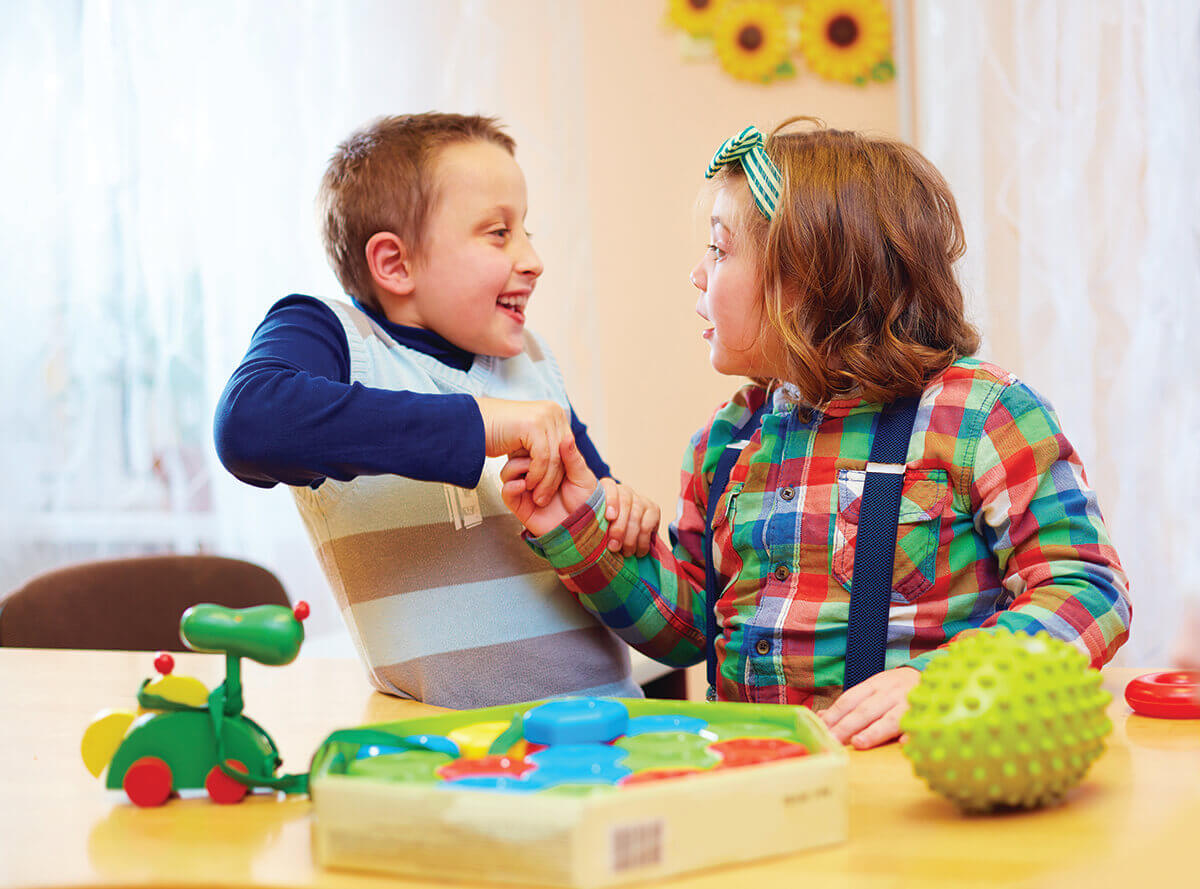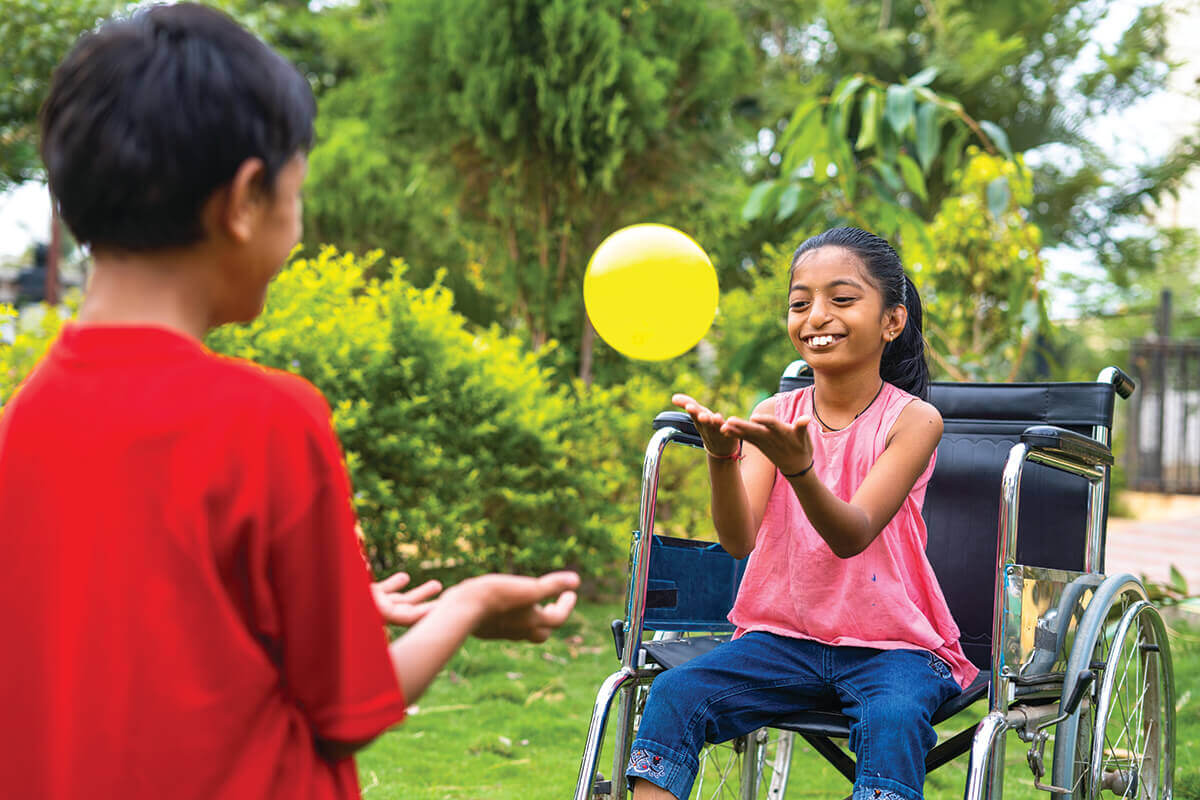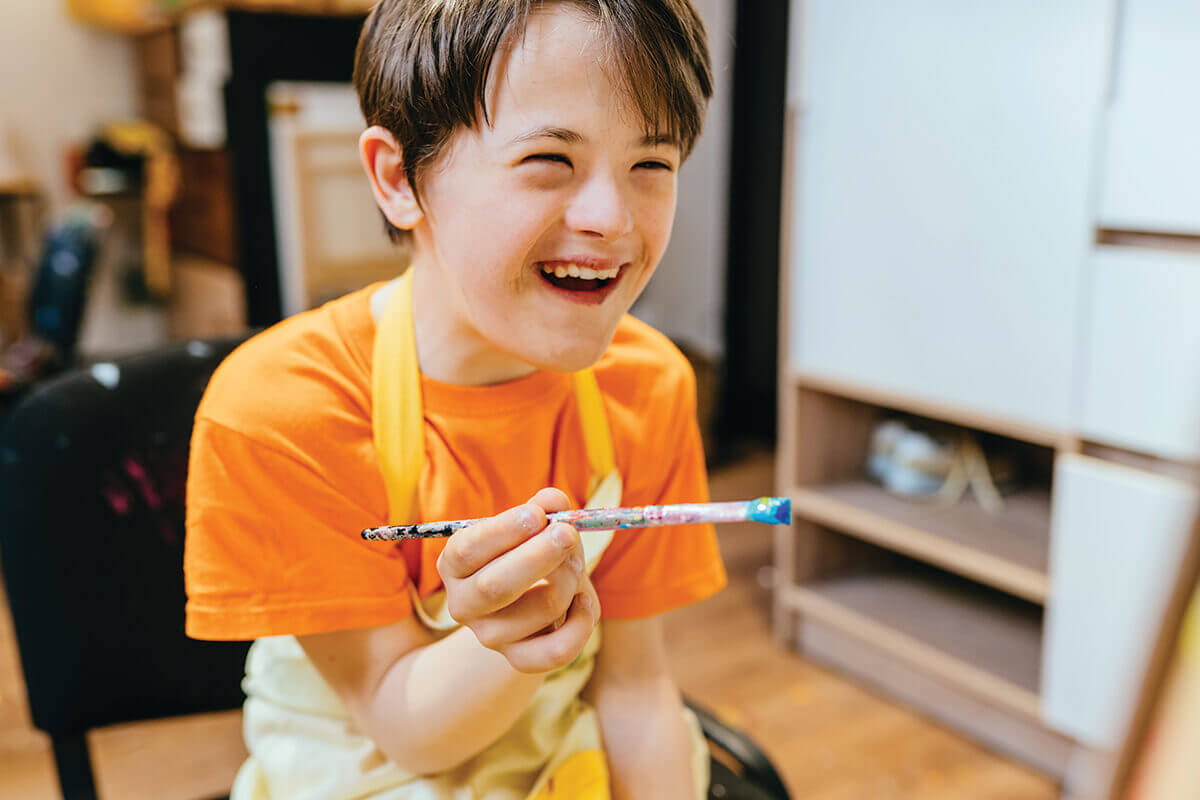Special Section
Soaring to New Heights
Local organizations offer support to parents and caregivers of people with disabilities as they help their loved ones to reach their greatest potential at every age.
By Timothy McShea — January 2023
Developmental disabilities are not selective, nor they are not something that can be managed one hour and ignored the next. For organizations like The Arc Baltimore—which serves those with developmental disabilities such as autism, Down syndrome, cerebral palsy, and more—flexibility is a key focus.
“We’re supporting people with developmental disabilities to lead fulfilling lives with a sense of belonging, purpose, and meaningful relationships,” says Chris Knoerlein, director of development and communications for The Arc, “and those services occur either in someone’s house, at their job, out in their respective neighborhoods—we’re basically supporting people in whatever level of need that they have.”
The Arc mainly serves adults in the Greater Baltimore area, but they also provide family services that aim to aid caregivers of kids with special needs. To help alleviate the financial difficulties some of these families face, the organization has its Family Fund, to which eligible individuals can apply for help with everything from emergency needs (like eviction protection) to assistance paying for services not covered by insurance (like eyeglasses), and even quality-of-life-improving activities like summer camp. For kids with special needs without a guardian, they provide foster homes that give these children medical support.
For caregivers, raising a child with a disability can be stressful and overwhelming. Whether a disability becomes more apparent as your child grows older, or it was there from birth, there is an added challenge and worry involved in taking care of someone with special needs. If you have been confronted with this unique challenge and are struggling to find a first course of action, it’s best to make a comprehensive plan for your child’s future.

For residents of Baltimore County, a good first step is to contact the Baltimore County Infants and Toddlers Program (BCITP). On their website, there is a guideline based on milestones, which will help you evaluate your own child’s development. The program itself will help you develop an Individualized Family Service Plan (IFSP), a precursor to the Individualized Education Plan (IEP). The IEP will be a combination of special accommodations for your child. The plan will change as your child grows older, to better reflect their needs as they reach certain milestones. The Maryland State Department of Education (MSDE) has a helpful parent guide on the eight-step process that comes with an IEP, including regular evaluations of a child’s development, at its website, marylandpublicschools.org.
When taking care of a younger person with a disability, school is a crucial asset, though there are also youth programs at various community living centers and nonprofits. Sometimes, just knowing a child has a safe and supervised place to go Monday through Friday can provide much needed respite for family and caregivers.
But what happens when your child grows past a certain age, graduates, and is faced with the responsibilities of adulthood? When school is no longer an option, where do you go for support? While adulthood to some might represent hope, freedom, and joy, Ami Taubenfeld, co-founder and executive director of Itineris, likened the transition, at least for caregivers, to “falling off a cliff.”
“That is the phrase used by many families in the autism world who are leaving school,” says Taubenfeld. “They were used to these wraparound supports, these small classes, these individualized programs, this definite attention to your basic challenges. A lot of that was there during school, and then it’s not.”
While there may be more support for children with disabilities, there are options for those transitioning into adulthood and beyond. While certain necessary skills are taught in school, some of those with special needs may require more support after they graduate.
Your child’s IEP through high school may focus on employment opportunities, providing a plan for post-graduation. Regardless, if your child is not in school, your IEP does not apply. Before looking at employment services specifically for adults with disabilities, it is important to start early, reach out to your IEP team while your child is still in school, and focus on skills that will be beneficial for adulthood.
If you are responsible for someone who has already graduated, The Arc is a great resource. They encourage people of all ages to reach out via their phone line for support and guidance. In Maryland, funding for the services may be found through the Developmental Disabilities Association (DDA). The process, which starts with an application to the DDA, is outlined on The Arc’s website, which details the process, step by step.
Itineris is another example of an organization that provides disability employment services in the Greater Baltimore area. They provide programs and services focused on helping people with Autism Spectrum Disorder (ASD) over the age of 20 to become independent of their caregivers. They describe themselves as a “work-first” agency, which means they focus on the necessary skills for employment.
“It’s really up to parents to strongly advocate for these purposes,” says Taubenfeld. “I tell parents all the time: Make sure that you understand you are not going to be here at some point and your child will not have you in their lives. What supports would they need on that day? And that’s what you need to ask for.”
Taubenfeld’s own personal experience showed her the necessity for these services provided by Itineris. Her daughter, Annie, has ASD and is currently enrolled in services provided by the organization. When Taubenfeld first joined the team that would go on to become Itineris, the group was made up of caregivers for people with ASD, searching for adult ASD employment services in the Greater Baltimore area, as well as Maryland, Pennsylvania, and Virginia. They found very few employment resources for adults and thus decided to form an agency themselves.
Since their formation in 2006, Itineris has rapidly grown. They currently provide services for 107 clients but receive at least 200 inquiries every year. And in light of the pandemic, which caused a decrease in employment opportunities and social interaction, the organization has added new services to meet its clients’ evolving needs.
Taubenfeld likes to quote a column written by Cindy Goodwin in USA Today, titled “The Coming Avalanche of Autistic Adults,” that goes as follows: “As the number of autistic children grows, so does the number of autistic adults. Their needs remain much the same as they age, yet the support they once received fades.” This is the primary challenge that confronts caregivers as their children grow into adulthood, and it shows why agencies like Itineris are crucial to long-term independence for those with ASD.
They aren’t the only organization to reach out to, though. (For more resources, see the guide that follows.) Though “the cliff” is a reality faced by all caregivers of kids with special needs, there are plenty of options for your child to soar over the challenges unique to their disability and become fully engaged adults. It’s all about helping your child reach their greatest potential at every stage of their life and giving them the support they need.

THE FAMILY & CHILD RESOURCE GUIDE
Below is a collection of organizations and services dedicated to offering education, legal, and financial support to individuals with disabilities and their caregivers.
THE ARC BALTIMORE
For 70-plus years, The Arc has supported people with developmental disabilities to lead fulfilling lives by providing employment training, day and residential services, family support and education, treatment foster care, assistive technology services, respite care, public policy advocacy, and information and referrals. Before an individual can begin The Arc Baltimore’s application process to receive on-going services, they must apply for and be approved for funding through the DDA. thearcbaltimore.org (410) 296-2272
ATHELAS INSTITUTE INC.
Utilizing a well-trained and dedicated staff, Athelas Institute provides a wide variety of quality educational, rehabilitative, residential, employment, and individual support options, programs, and services for individuals with intellectual and developmental disabilities. athelasinstitute.org (410) 964-1241
AUTISM SOCIETY OF BALTIMORE-CHESAPEAKE (ASBC)
This all-volunteer group, part of a national network, serves the autism community in the Greater Baltimore area, providing information, advocacy, and support for families and individuals. They offer a monthly support group specifically aimed at adults with autism that gives people a space to talk with others who understand them and work through issues that they may be facing. Other support groups and activities are available for individuals and their family members and caregivers. ASBC also provides recommendations for other local resources if they think something might meet an individual’s needs. baltimoreautismsociety.org (410) 655-7933
BALTIMORE COUNTY INFANTS AND TODDLERS PROGRAM
This program provides services for families of children aged 0-36 months who have—or may have— developmental disabilities, delays, or special health needs. BCITP services are collaboratively provided by the Baltimore County Department of Health, Baltimore County Public Schools, Baltimore County Department of Social Services, and other public and private agencies. dci.bcps.org/department/special_ education/birth_to_five_services/infants_and_toddlers (443) 809-2169
THE BALTIMORE LAB SCHOOL
Founded in 2000, this school serves bright, motivated students in grades 1-12 who have learning disabilities and/or ADHD/ADD. baltimorelabschool.org (410) 261-5500
THE CENTER FOR AUTISM AT SHEPPARD PRATT
Sheppard Pratt’s Center for Autism provides autism diagnostic services and subsequent case management services for individuals with autism spectrum disorder throughout their lifespan. Medication, therapy, job training, inpatient care, and housing are just a few of the resources available to those who choose to utilize this facility. This program does not take insurance; however, some costs might be paid back through certain mental health coverage plans. sheppardpratt.org (410) 938-5000
CHILD FIND
This is a special education service provided by all public school systems under the Federal Individuals with Disabilities Education Act to identify children ages 3-21 with educational disabilities who may be eligible for special education and related services. dci.bcps.org (443) 809-3017
THE CHILDREN’S GUILD
Founded in 1953, this nonprofit serves children, families and child-serving organizations and is dedicated to transforming how America cares for and educates its children through education, behavioral health, and national training and consultation services. Whether it’s academic support, special education programming, mental and behavioral health services, workforce development, or treatment foster care, The Children’s Guild cares for the whole person to make a positive impact and help children and families thrive. childrensguild.org (410) 444-3800
CCBC CENTER FOR ALTERNATIVE AND SUPPORTED EDUCATION (CASE)
CCBC’s CASE Program offers coursework for people of all reading and math levels, as well as vocational programs for students with disabilities who want to learn skills for the workplace. CASE-Single Step provides students with academic, pre-vocational, social, and independent living skills. ccbcmd.edu/ Programs-and-Courses/Adults-with-Disabilities.aspx (443) 840-3262
DISABILITY RIGHTS MARYLAND (DRM)
The nonprofit is Maryland’s designated protection and advocacy agency (formerly known as Maryland Disability Law Center). DRM is federally mandated to advance the civil rights of people with disabilities and provides free legal services to Marylanders of any age with all types of disabilities. disabilityrightsmd.org (410) 727-6352
DOWN SYNDROME ASSOCIATION OF MARYLAND
Formed in 1982 by a small group of parents with children affected by Down syndrome, this nonprofit (formerly Chesapeake Down Syndrome Parent Group) serves those with Down syndrome and their families in the Baltimore metro area by providing information and support. cdspg.org First Call hotline: (443) 300-6972
EASTER SEALS
Easter Seals Adult Day Services has two missions: offering individualized care for people with disabilities and giving respite for those who provide care. The facility hosts a variety of activities and services, and their staff encourages self-expression, aiming to include specific interests in day-to-day programming. easterseals.com (410) 277-0940
FIRST MARYLAND DISABILITY TRUST
Comprised of disability and elder law attorneys, this organization aims to help people with disabilities maintain access to benefits, both public and private, in order to make sure the individual’s needs are properly and consistently met. They offer cost-effective trust services to protect, manage, and use trust assets for Marylanders with disabilities while preserving their eligibility for public and private benefits. firstmdtrust.org (410) 296-4408
HEARING AND SPEECH AGENCY (HASA)
HASA serves more than 4,000 children and adults every year, helping them communicate more effectively through education, hearing health, inclusion, language access, and speech and language programs. The organization offers services on its Baltimore campus, in community-based programming, and at the nonpublic, coeducational Gateway School, which serves children with autism, development disabilities, and communication disorders. HASA.org (410) 318-6780

ITINERIS
Originally formed as a research team made up of caregivers for children with Autism Spectrum Disorder (ASD), Itineris describes itself as a “work-first” agency for adults with autism in the Greater Baltimore area. They have employment services to help clients find the best available occupational opportunities, as well as community development and behavioral support services. Itinerisbaltimore.org (443) 275-1100
KENNEDY KRIEGER INSTITUTE
Kennedy Krieger provides a wide range of services for children, adolescents, and adults with diseases, disorders, and injuries that impact the nervous system. The Institute is home to a team of investigators who contribute to the understanding of how disorders develop, while at the same time pioneering new interventions and methods of early diagnosis, prevention, and treatment. kennedykrieger.org (443) 923-9400
THE LEAGUE FOR PEOPLE WITH DISABILITIES
This organization offers programs and services to assist people with disabilities in their daily lives. There’s a medical day program specifically aimed at serving adults, as well as resources like vocational services and recreational opportunities for people of all developmental, cognitive, and physical levels. The Youth Autism Services Program partners with the families of children under the age of 21 who have autism spectrum disorders. leagueforpeople.org (410) 323-0500
L.I.F.E. INC.
L.I.F.E. stands for Living in a Free Environment, and their mission is to help people with disabilities do just that. Their adult medical day program, located in Arbutus, provides access to medical care, activities, meals, and more. Transportation is available for participants within a certain radius. L.I.F.E. also offers a community living program with care options that correspond to each person’s needs, from around-the-clock support to more independent living. lifeinc.org (410) 735-5433
MARYLAND ASSOCIATION OF NONPUBLIC SPECIAL EDUCATION FACILITIES (MANSEF)
MANSEF represents more than 70 nonpublic schools throughout Maryland that serve students with a range of disabilities, including physical, emotional, and developmental needs that cannot be adequately met in public schools. mansef.org (410) 938-4413
MARYLAND DEVELOPMENTAL DISABILITIES ADMINISTRATION (DDA)
Part of the Maryland Department of Health, the DDA is the primary state agency that funds community-based services and supports for people with developmental disabilities. The Low Intensity Support Services (LISS) program provides funding for children living at home with their families and adults with developmental disabilities living in their own homes in the community to help pay for services not provided by DDA. health.maryland.gov/dda/Pages/ home.aspx (410) 767-5600
MARYLAND FAMILY NETWORK’S CHILD CARE SPECIAL NEEDS SERVICE
Maryland Family Network has a service for parents and caregivers of any child with an IEP (Individualized Education Plan) or an IFSP (Individualized Family Service Plan) from birth through age 21 who is in need of assistance finding childcare. The service is free and funded by the Maryland State Department of Education. marylandfamilynetwork.org (800) 999-0120
THE PARENTS’ PLACE OF MARYLAND (PPMD)
Staffed primarily by parents of children with disabilities and special health care needs, PPMD offers a variety of programs and services that support thousands of families facing these challenges, including a downloadable guide to Navigating the Special Education System. ppmd.org (410) 768-9100; (800) 394-5694
PATHFINDERS FOR AUTISM
Maryland’s largest autism organization, Pathfinders for Autism is working to support and improve the lives of individuals affected by autism through expansive, customized programming and by providing resources, training, information, and activities free of charge. For adults specifically, Pathfinders offers their own resources, as well as information about other valuable options like medical care, support groups, and employment. pathfindersforautism.org (443) 330-5341
SHEPPARD PRATT SCHOOLS
Sheppard Pratt is the largest provider of nonpublic special education schools and programming in Maryland and also offers free in-school programs. The schools serve students with autism spectrum disorder, behavioral disabilities, and intellectual disabilities. sheppardpratt.org (410) 938-3000
MARYLAND DEPARTMENT OF DISABILITIES (MDOD)
MDOD is focused on offering employment resources like housing, education, transportation, and disability benefits. Employers looking to hire people with disabilities can also turn here to learn more about disability law and accommodations, as well as how people with disabilities can positively impact the workplace. mdod.maryland.gov (410) 767-3660
RESOURCE FINDER AT KENNEDY KRIEGER INSTITUTE A project of the Maryland Center for Developmental Disabilities, this service helps families, consumers, and professionals find the information and access they need to community services, trainings, etc. on intellectual and developmental disabilities as well as related disorders. They can give parents information on everything from education and childcare resources to recreation, parenting, and caregiver resources. resourcefinder.kennedykrieger.org (443) 923-9400; (800) 390-3372